Just as in the opening of Disney's "Jungle Book" is narrated that "Many strange tales are told of this jungle, but none so strange as the cub called Mogli", so too many strange tales are told of the Siddhas.
Who are these Siddhas?
I have come to see them as spiritually elevated souls, literally too, who once walked this very earth just like you and me but now are placed or elevated themselves to a plane much higher than us, much purer, more subtle and that is not affected the least by the laws of our world. This plane transcends time and space too. Even as they keep Erai company, their compassion that is beyond words has made them frequent this earth of us, in the hope of elevating us too to their status. Hence resulting in the advent of the occasional strange phenomena and miracles we have seen.
We have basically being living the life of a frog in a well. Science has made great leaps and advancement and has brought us an immense understanding of the world around us including new concepts and ideas. Science has enlightened us in many ways about the world we live on. Today we understand our world better. We understand ourselves better. As the scientist took to solving the tremendous mysteries of life on our planet, the Siddhas took towards solving the mystery of the spirit and the soul besides studying the physical body and nature.
Our perception of life is based basically on our experiences. To a man who has lived his life in poverty, he cannot possibly envision life beyond these walls. To a man who has lived his whole life in comfort, born with a silver spoon in his mouth, he cannot possibly envision life under extreme poverty. Both these people go about their lives convinced that their world is all there is because it is all that they can experience. The fish that breaths in water will gasp for air if laid on the ground. The air around us is of no use to it. The air in the water keeps it alive. Then there are animals that can live both in the water and land. Other animals and man need air to survive. So every creation keeps to its own habitat hardly venturing out of it. For it, that is its world. Apparently, they abide to different laws of nature, they abide to different aspects of nature.
Imagine you are living in a lake. You are a fish with eyes on either side of your head and all you know is the underwater world of sediment and vegetation and other fish swimming around you. The sunlight comes in, dimmer and refracted, through the water. You go about your life convinced that this underwater world is all there is because it’s all that you can experience. However, there exists an entirely new environment outside of your line of sight — one where animals don’t need water to breathe and flowers bloom in a far more arid world. This is the situation physicists believe we’re in. We are those fish and those higher dimensions are the new environments we can’t perceive.
She goes on to enlighten us on the string theory in simple terms.
String theory also has an answer for the mysterious moment before the Big Bang occurred. The universe then consisted of nine perfectly symmetrical dimensions and one time dimension. The first four are perceptible to us while the last six or seven were reduced down to a size smaller than an atom.
The four fundamental forces - gravity, weak nuclear, strong nuclear, and electromagnetism - were held together under extremely high pressure and temperature. When it became unstable, it broke into the dimensions of time and space we know today.
First Dimension - A line connecting two points. There is no depth and no height, only a width. You can call this the x-axis.
Second Dimension - Now we have added height or the y-axis. Think of any flat figure, like a triangle.
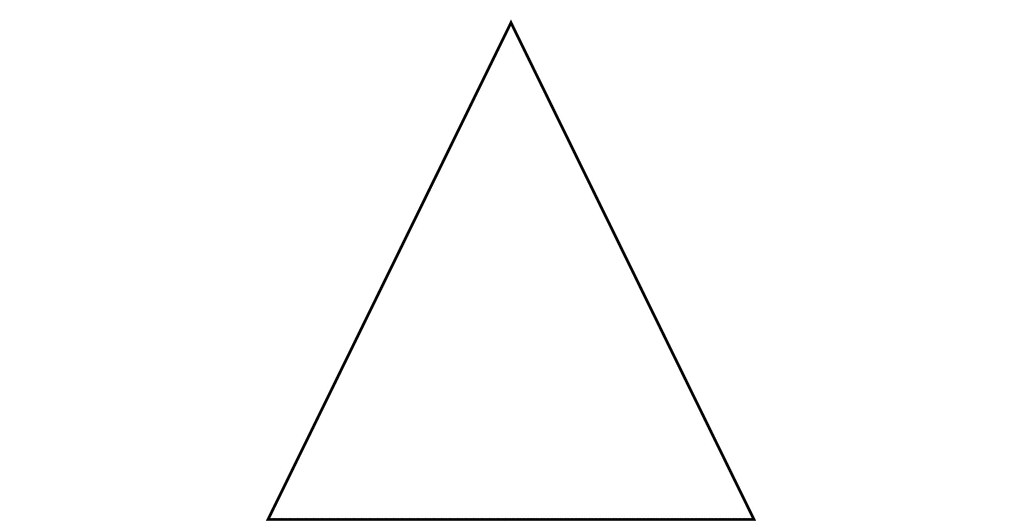
Third Dimension - We have now added depth or the z-axis. This is the dimension in which we experience the world. It includes volume and the ability to obtain cross sections from objects. You can think of this dimension as space without time. A three dimensional triangle is now a pyramid.
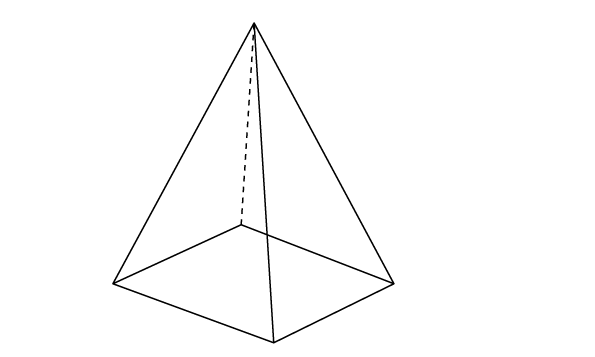
Fourth Dimension - The fourth dimension is not a spacial one but it consists instead of time. Time helps plot an object’s location in the universe and also adds a way for the third dimension to change. Remember how the third dimension is space without time? Well now we officially have space time. Fourth dimension as a tesseract.
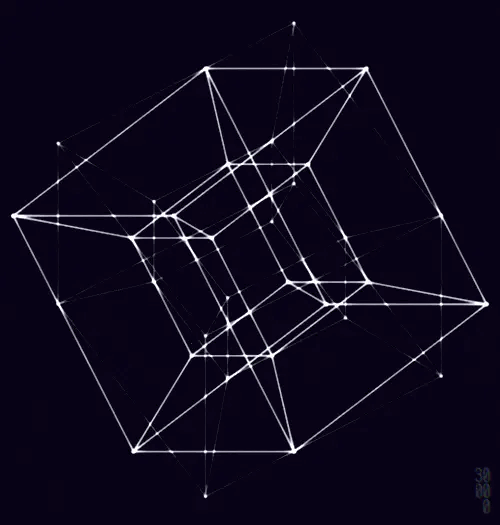
Fifth Dimension - From here on we begin to see the higher dimensions. These are imperceptible to us, scientists believe, because they exist on a subatomic level. These dimensions are curled in on themselves in a process known as compactification. The dimensions here on out really deal with possibilities. In the fifth dimension there would be a new world that would allow us to see the similarities and differences between our world and this new one, existing in the same position and having the same beginning as our planet, i.e. the Big Bang.
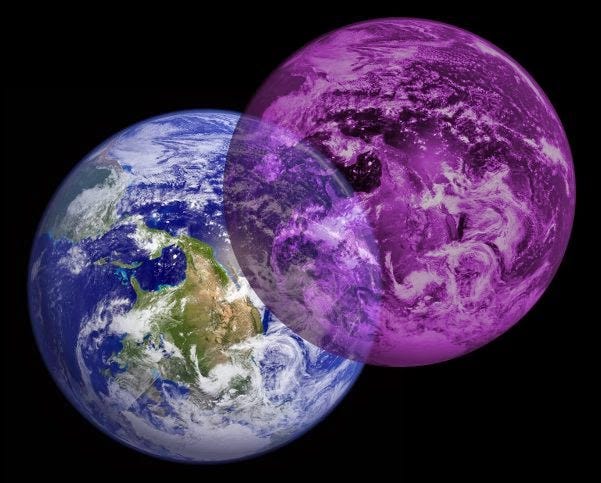
Sixth Dimension - The sixth dimension is an entire plane of new worlds that would allow you to see all possible futures, presents, and pasts with, again, the same beginning as our universe.

Seventh Dimension - In the seventh dimension up through the ninth, we now have the possibility of new universes with new physical forces of nature and different laws of gravity and light. The seventh dimension is the beginning of this, where we encounter new universes which have a different beginning from ours. That is, they were not born from the Big Bang.
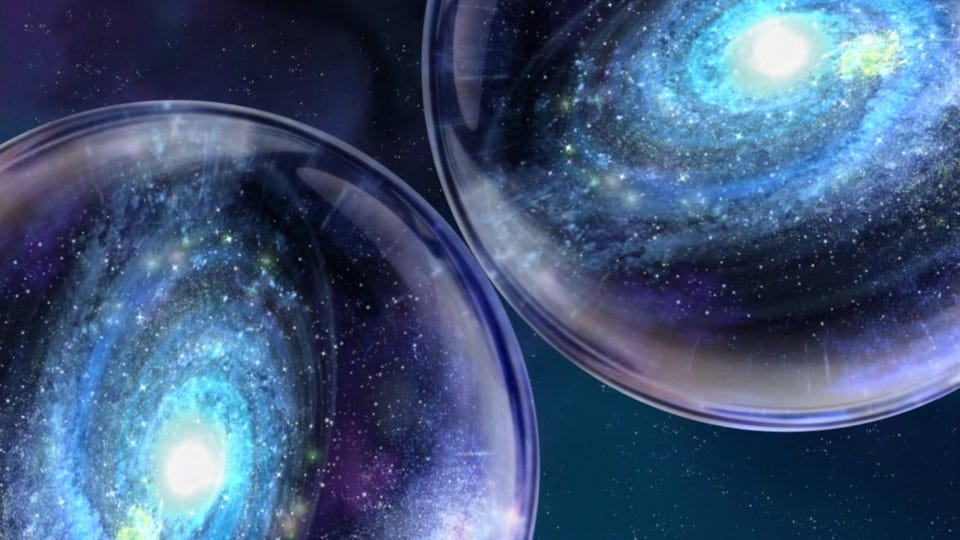
Eight Dimension - This dimension is a plane of all the possible pasts and futures for each universe, stretching infinitely.
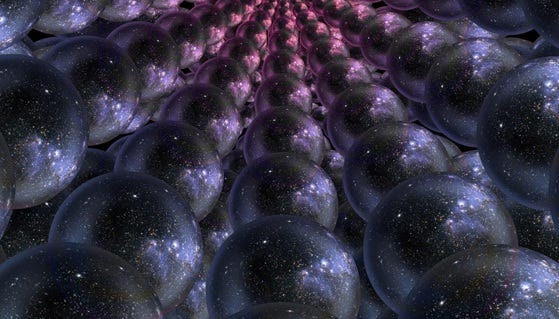
Ninth Dimension - The ninth dimension lays bare all the universal laws of physics and the conditions of each individual universe.
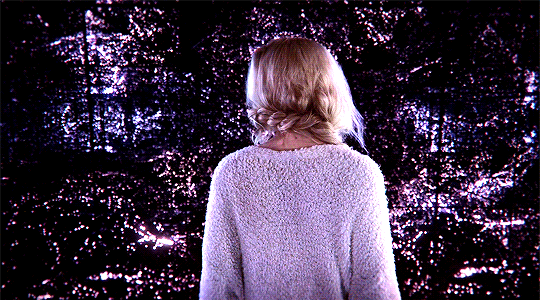
The Tenth, or Eleventh Dimension - Some scientists believe that the multiverse has only 10 dimensions while others put that number at 11. However, a universe cannot have more than 11 dimensions because of self-consistency — they become unstable and collapse back down into 11 or 10 dimensions. At this point, anything is possible. There are all futures, all pasts, all beginnings and all ends, infinitely extended, a dimension of anything you can imagine. Everything comes together.
She sums up beautifully,
While the idea of a multiverse is fun in terms of science fiction and daydreaming, it’s also mathematically sound and would provide the framework for a theory of everything - which is exactly what string theory attempts to be. It would be a beautiful coming together of science, math, and mysticism.
When I attended a course in Neuro-Linguistic Programming (NLP) some years back, we in the class were asked to draw an elephant on an A3 size paper. As I am good in drawing, I drew a detailed drawing of an elephant that got the praises of the whole class. We laughed at others seeing their attempts at drawing. One drew a very tiny elephant in a corner of the large paper while another began to draw a large elephant that the large paper could only accommodate its torso and there was no room on the paper for the rest of its body. Finally, it turned out that we all became subject to laughter, when our tutor told us he would draw an elephant and went on to place a dot with his marker pen on that large piece of A3 paper. "That's it", he told us! We were shattered when he told us that his view of the elephant was from a different plane, that of space. I realized then that I needed to think out of the box. All new possibilities and frontiers are out there if only we were not rigid in our thinking and welcome them.
To illustrate our dependence on the language and the spoken word that confines us to a tiny space and mode of thought, he gave us a long list of stuff that he asked us to imagine we were carrying on board a sailing vessel. Then a hole appears on the deck. Water is gushing in. We are to ditch the stuff on the list to keep the vessel afloat instead of sinking. He began us thinking about what to ditch first. At the end of the session, he asked us to present our move and action to save both the vessel and us. Off course all of us listed the heavy items needed to go first, keeping the featherweight last. He then jolted us from our trend of thinking asking us why did not we use all the stuff to fix or mend the hole on deck? It was another blow to us!
He moved on to challenge our perspective, perception and view by holding an ATM card before us. He questioned us on what we saw. We all saw him holding an ATM card before us. But when he asked us to describe exactly what we saw, the answers varied according to the position the class was sitting at and their angle of vision. Someone sitting directly in front only saw the front side of the card. Another sitting behind the tutor saw only the back side of the card while those sitting on the left and right sides of the tutor saw only a thin line. This simple exercise in perception applies to everyday life too. The object in our vision or thought although the same, will vary in perception and view and in opinion as a result of our stature or status in life, our past experience, our knowledge and wisdom, our learning and of course where we are standing. We came away from the course more enlightened. No opinion is wrong. No vision is wrong. No understanding is wrong. Time and space determine our vision, perspective, understanding, and opinion.
